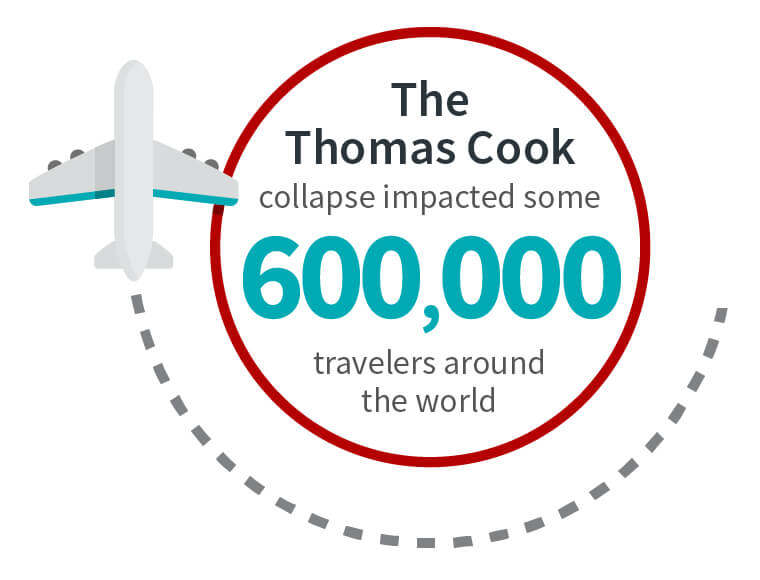How Thomas Cook just Made it Harder for Travel Companies to Find Merchant Processing
Thomas Cook was a major name in global travel for many decades. The 178-year-old company employed 21,000 people globally and helped millions of consumers traverse the globe each year. That couldn’t save the company from slipping into debt, however, and the resulting collapse of the company sent ripples throughout the travel industry.
Travel: Already a Challenging Vertical
The travel industry can be a rewarding—and lucrative—field in which to work. There’s a lot that goes into running a business in this vertical, though. For example, while you must obtain a merchant account before you can start accepting payments from customers (just like any other business), doing so with a Travel business presents a unique set of challenges.
Travel is what the payments industry calls a “high-risk” vertical. Not without reason, either, given the fallout from the high-profile collapse of several travel companies, including the UK firm Thomas Cook on September 23, 2019.
Deeply in debt, management at Thomas Cook attempted to reach a deal with top shareholder Fosun Tourism Group to bail out the company. They failed to reach a deal by the deadline of September 22, 2019, though, leading the company into official bankruptcy.

Under UK law, any company declaring bankruptcy typically goes into a process called administration. A third party takes over leadership of the company with the goal of rescuing the organization; if that proves impossible, the administrator works to produce the best outcome possible for the majority of stakeholders.
When the Thomas Cook bankruptcy became official, the company’s planes were immediately grounded and impounded at airports in the UK. The administrator then began the process of liquidating the firm to cover as much of the company’s debt as possible.
Refunds or Chargebacks, Someone Has to Pay
Needless to say, Thomas Cook’s sudden implosion left a lot of customers in limbo. The collapse impacted some 600,000 travelers around the world, many of whom found themselves suddenly stranded abroad with no immediate way to get home. Many thousands more had already paid for and booked trips with the company, but Thomas Cook was in no position to offer hundreds of thousands of refunds, each of which could be several thousand dollars.
Although Thomas Cook reportedly had £50 million on deposit with their acquirer to underwrite the company’s risk, the cost of all those chargebacks is expected to be more than ten times that amount. That means the bank, at least for now, will be stuck with the tab.
The company’s acquirer will be required to take responsibility for Thomas Cook’s chargebacks. That fact will impact the assessment of the general risk that travel companies present to banks, across the board. As Carl Churchill of NetPay Solutions Group put it, “A lot of card acquirers will be taking a very cold bath on Thomas Cook. Everyone has to recognize the risk of Travel is more than it used to be.”
The Cost of High-Risk Travel Processing
While Thomas Cook is the world’s oldest and largest travel company, this could still be seen as just the collapse of one institution in the Travel sector. Unfortunately, everyone ends up paying the cost when incidents like these occur. For instance:
- Acquirers are forced to cover losses out-of-pocket when merchants have more liabilities than assets.
- Merchants of the same type are seen as more of a risk to banks, meaning they must pay higher fees and maintain larger reserves of cash as conditions for receiving the bank’s services.
- Consumers pay higher prices to travel because airlines, OTAs, and other merchants now have higher costs.
- Card Schemes, who earn much of their revenue from transaction volume, make less money when consumers conduct fewer transactions.
In the travel space, you can face other obstacles in addition to this cyclic process, such as having a predominately international customer base, or typically selling high-dollar value items. Other forces like political unrest or international crime can be factors, too.
With all these obstacles stacked against you, it’s unlikely you’ll be able to secure a standard merchant account. Like most travel merchants, you’ll probably be required to work with a high-risk processor to accept card payments. That means considerably higher fees ... but there are benefits, as well.
Making High-Risk Processing Work
Working with a high-risk processor is—at best—a mixed bag. As we noted, a high-risk processor typically charges above-average fees while demanding strict contract conditions. You’ll also be required to maintain a merchant account reserve. In other words, a portion of your revenue will always be kept sidelined and inaccessible to you, to insulate your acquirer against a sudden spike in chargebacks like what happened after the Thomas Cook collapse.
Keep Your Chargeback Ratio Low…or It Could Cost You.
Click here to see how much you’ll save with comprehensive chargeback mitigation.

Despite these drawbacks, a high-risk account does offer certain advantages. For instance, you won’t be limited by the number of card transactions you can process each month, nor will you be restricted to maximum purchase amounts per individual transactions. That can be important, given the high-ticket values and seasonal nature of the travel sector.
Even better, a high-risk processor will give you more leeway with fraud and transaction disputes. A standard merchant processor might freeze or even terminate your account without notice if you even get close to breaching acceptable chargeback thresholds set by Visa and Mastercard. Working with a high-risk processor, however, helps ensure that your processing ability remains secure.
Want to learn more about high-risk processing, or how to partner with a high-risk processor? We’ve put together a list of recommended high-risk processors on our blog to help weed out the bad actors. All the processors on our list are verified and recommended by Chargebacks911®.
Thomas Cook Chargebacks Will Affect You, Too
Of course, just because you’re not in as much immediate danger from chargebacks doesn’t mean you should let disputes go unaddressed.
When one travel company falters, others can face consequences that no one anticipated. The Thomas Cook collapse, for instance, will make consumers more open to filing disputes with even less consideration beforehand. Consumers begin requesting chargebacks regardless of whether they’re justified, because they believe the process is easier than going to the merchant to ask for a refund.
Between 30% and 50% of claims made against a business after it has gone into administration are wrongfully filed or processed outside of valid rules. The resulting ease of filing a chargeback trains consumers to believe there are no negative consequences, and that the process is victimless. In fact, many consumers don’t even understand the difference between a refund and a chargeback. They know that they got their money back; beyond that, the process is a mystery.
This creates a culture of zero-liability in payments that encourages cardholders to be less discerning regarding chargebacks. It’s the reason why 40% of cardholders who request a chargeback will do so again within 60 days.
Don’t worry, though: Chargebacks911® offers the solution.
Our line of chargeback mitigation tools and strategies is uniquely-designed to address the challenges facing travel industry merchants. Plus, our services are backed by a 100% ROI guarantee. Don’t lose another dispute. Click below and learn how Chargebacks911 can help you recover revenue, reduce costs, and improve processes today.












